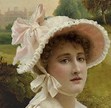Heather King's Blog
January 1, 2025
The Horse: Volume III
Happy New Year, Everyone!

I am thrilled to be able to announce that after a year of scurrying down research rabbit holes, The Horse: An Author's and Reader's Guide Volume III is now available in paperback! It is a hefty tome, but packed with all those little details historical readers love. Just who was the landlord of the White Hart, Bath, or the Ship Inn at Dover? You will find the answers to these and myriad other questions within these pages.
Amazon UKAmazon US
Happy Reading!
Heather
January 19, 2024
THE ENGLISH COUNTRY HOUSE – The Bedchamber
 Bedchamber at Eastnor Castle, Herefordshire (Author)
Bedchamber at Eastnor Castle, Herefordshire (Author)Unlesswe live in a flat or bungalow, most of us in this modern age goupstairs to bed, but this was not always the case. In earliercenturies, it was customary for the wealthy to conduct their livespretty much on the one floor, with bedchambers added beyondwithdrawing rooms. This can be seen at houses such as Chatsworth,where the State Apartments have a corridor of doors, called anenfilade, stretching in a line from the State Dressing Room throughthe five other State Rooms and ending in the State Dining Room. Thisarrangement has evolved from the medieval custom of a chamber whichwas used for daily activities, for eating and sleeping, for businessand the receiving of guests. As greater privacy became important, sothis chamber was divided into smaller spaces until separate roomswere incorporated into the design, first introduced at the beginningof the seventeenth century and seen today in Palladian country housesof the Georgian period.
As asign of rank and wealth, the bedchamber became more public, if lessso than those in France. Rows of stools and chairs, covered in richupholstery, were set against the walls and the room was furnished ina manner befitting a principal salon or reception chamber. The beditself was hung with fabulous curtains and had the owner’s cresteither embroidered or carved on the bed-head. This was, of course, afour-post bed, with a tester (‘ceiling’) or canopy lined withpelmets to keep out draughts (and hide the rails) and embellishedwith ostrich plumes. Charles II slept in such a bed at Powis Castlein Powys. By 1678 he had issued the directive, ‘Persons of Qualityas well our servants as others who come to wait on us are permittedto attend and stay us in the withdrawing room.’ This, then, was theforerunner of the Drawing Rooms held at court during the eighteenthand nineteenth centuries. Although his bedchamber was lessaccessible, royal princes were admitted by right whenever they chose,whilst privy counsellors and other state officials were required toseek permission to gain access. Following the French custom, Charlescaused the royal bedchambers in his palaces to have the bed set backwithin a balustraded alcove. This arrangement can still be seen inthe bedchamber at Powis Castle, which was prepared for him in thestyle he had adopted from the Continent.
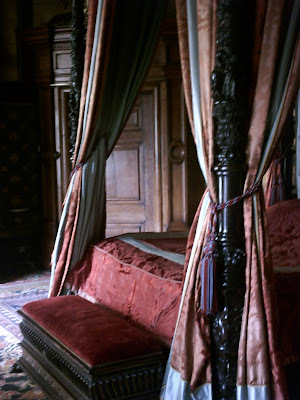 State Bedroom, Eastnor Castle (Author)
State Bedroom, Eastnor Castle (Author)Whilst there is no balustrade, a bedchamber at the Brighton Pavilion shows the bed to be set back within an alcove as well as various furnishings to be found in the Regency era, if perhaps more elaborate than would be found in the generality of country houses.
 Bedroom in the Brighton Pavilion, old print
Bedroom in the Brighton Pavilion, old printAtRagley Hall in Warwickshire, designed circa 1678 by Robert Hooke (forCharles II’s Secretary of State, Lord Conway), the four so-calledpavilions each contained a separate apartment, accessed from acentral hall and saloon. Each had a drawing or withdrawing room,beyond which lay a bedchamber, a closet, a servant’s chamber and abackstairs to the kitchens &c. To the left and right of the hallrespectively lay the chapel and the library. The saloon doubled asthe dining room,
Bycontrast, whilst still possessing the pavilion wings, Hagley Hall inWorcestershire, built circa 1752 for Lord Lyttelton by SandersonMiller and probably inspired by Croome Court, was designed to havetwo circuits of rooms which overlapped. To one side of the centralhall and saloon lay a suite of private apartments, including thelibrary, and to the other, the public circuit of dining and drawingrooms and the gallery. The bedchambers had by now been settled on theupper floor. With the emphasis changing in the country fromhigh-ranking guests being entertained in a small number of grandapartments to visitors choosing to occupy their time in publicsaloons and drawing rooms rather than their own chambers, these lastbecame reduced in size and importance. To accommodate this, anincreased number of smaller apartments were included in architecturalplans, with the average suite having a bedchamber and a dressingroom, with perhaps also a closet. Such dressing rooms were often alsoused as sitting rooms and were handsomely fitted out. At BerringtonHall in Herefordshire, there are two such chambers, known as theWhite Dressing Room and the Corner Dressing Room, furnished asbedrooms (but about a hundred years after the Regency) and each witha small closet.
At Hanbury Hall, Worcestershire, built around 1701, the main entranceled into the Great Hall, with a Smoking Room and Steward’s Roombeyond. From the Great Hall to the right, the visitor might entereither the Great Parlour or the Lobby, through which was reached theWithdrawing Room and the master’s bedchamber and dressing room. Theceiling was later altered to remove the lobby wall and form a drawingroom in place of the Great Parlour and amalgamate the Lobby andWithdrawing Room into what is now the Dining Room.
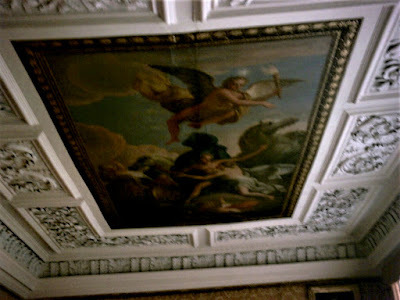 Withdrawing Room (Dining Room) Ceiling, Hanbury Hall (Author)
Withdrawing Room (Dining Room) Ceiling, Hanbury Hall (Author)Followingthe enclosures of land in the fifteenth and sixteenth centuries, theproduction of wool had brought a great deal of prosperity to theseshores and many early bed-hangings were produced in woollen cloth,some of which have survived to this day. For the wealthy, Spanishmerino (introduced to Britain by George III in 1786) offered a warmerand less dear option than the expensive silks and satins which fadedand failed to give ‘that clean appearance’ required by theEnglish aristocracy. With the advent of cotton, the heavy moreen(liable to attract moths) and similar fabrics lost favour. Chintz,calico, dimity and muslin became popular for bed-hangings, curtainsand upholstery during the Regency, being washable and far cheaperthan Jacquard imported from France. A patent for an English versionwas issued to Stephen Wilton in 1820, allowing the textile industryin Britain to breathe more easily. Just before the start of theRegency proper, in about 1809, the ‘gaudy colours’, as Ackermanndescribed them, of chintz and calico furnishings yielded to ‘a morechaste style’ which required only two colours to create an effectsimilar to damask.
Regencydesigners took inspiration from many different periods, and so thecountry house guest might find their bedchamber decked out withGothic, Greek or Egyptian influences, in the Chinese style so muchvaunted by the Prince of Wales, or in patterns incorporating stripes,trelliswork, architectural or geometric shapes. Curtains for windowswere usually of a hue complementary to those on the bed, with liningsin a colour to march with that. Quite often, the curtain at the headof the bed was gathered in a semicircular pattern resembling thesun’s rays, to add definition to the design. Bed linen wascustomarily white or the natural colour of the fabric, and blanketsthat of the wool from which they were made, although in wealthyhouseholds personal whims were no doubt accommodated. The same couldbe noted for the counterpane. Authors, please note here that the wordbedspread is of American origin, dating from 1845.
AState bed of about 1754, part of a suite made by William Linnell forthe Chinese Room at Badminton House in Gloucestershire, was decoratedin Oriental emblems and japanned in gilt, red and black. It had apagoda-style top ornamented with feathers, panels on the bed-headdecorated in a geometric design reminiscent of brick paving, and(probably) neutrally coloured linen and hangings, but these have beenreplaced in modern times. Messrs. Gillow of Lancaster designed acanopied bed-head thought to be Egyptian in style, with swags ofgreen and pink fabric caught into bunches above a carved frame thatwas filled with white material ornamented with rosettes and fringing.The heads of sphinxes which surmount four posts suggest, however,that the original inspiration had come from Classical Greece.
Curtainsfor windows in aristocratic houses were not always plain but might beprinted and fringed, sometimes of cotton and sometimes of silk, andgenerally reaching to the floor. In 1803, Sheraton noted that whilstfestoon curtains, drawn vertically, were still to be found inbedrooms, the French rod curtain had become widely introduced infashionable houses. On a similar system to that we see today, thesecurtains hung from a wooden or brass rod and were drawn horizontally,either hidden behind a pelmet or swags of fabric or left on displaywith rosettes or tassels to show where the material was attached. Therings had strings which connected to a pulley, enabling the curtainsto be drawn.
Bedroomfurniture of the Regency era included a wash-hand stand, a dressingtable and stool with looking-glass, an armoire or wardrobe, tables,chairs, an ottoman or chaise longue and perhaps a cheval mirror. Inthe early seventeenth century, a matched set of pier glass, piertable and candlesticks was a common facility provided in largehouses. These items were principally designed for display rather thanpracticality and were elaborately fashioned: with marquetry, withlacquered finishes, inlaid with pewter and even made of silver. They weresited against the pier between the windows (hence the name), usuallyopposite the bed to catch the best daylight in the morning and thebest candlelight at night. Gradually, with the increasing use ofdressing rooms, the dressing table as we know it today was developedfor practical use and placed, with wardrobes and other furniture forthe pursuit of dressing, in the secondary room. Sometimes this alsocontained a truckle bed for the accommodation of a maid or valet.
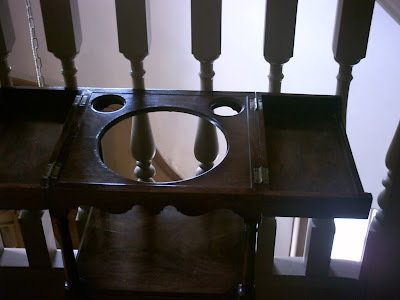 Wash-hand Stand, Hanbury Hall (Author)
Wash-hand Stand, Hanbury Hall (Author)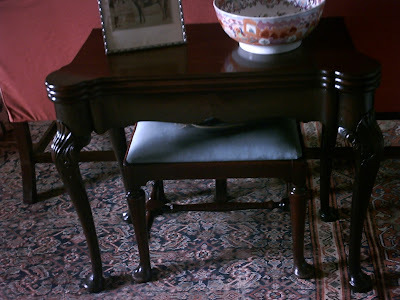 Dressing Table with Stool, Hanbury Hall (Author)
Dressing Table with Stool, Hanbury Hall (Author)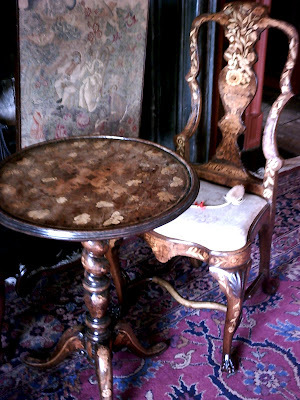 Marquetry Table and Chair, Hanbury Hall (Author)
Marquetry Table and Chair, Hanbury Hall (Author) Chair and Pier Table, Hanbury Hall (Author)
Chair and Pier Table, Hanbury Hall (Author)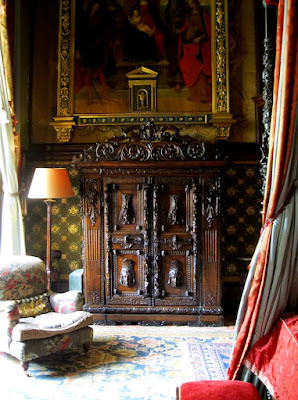 Cabinet or Wardrobe, State Bedroom, Eastnor Castle
Cabinet or Wardrobe, State Bedroom, Eastnor Castle(Susana Ellis, with permission)
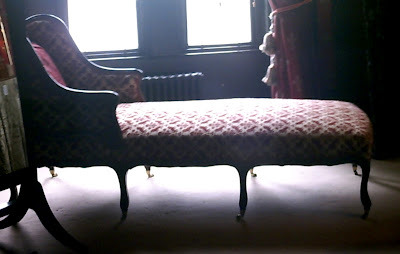 Chaise Longue, Eastnor Castle (Author)
Chaise Longue, Eastnor Castle (Author)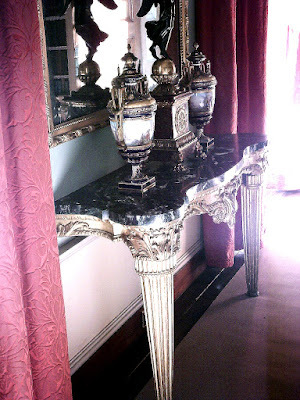 Pier Table and Glass, Berrington Hall (Author)
Pier Table and Glass, Berrington Hall (Author)Asvery few Regency hangings have survived the centuries,representations of bedrooms of that era are hard to find, most havinglong since been redecorated to Victorian or Edwardian taste. AtHartlebury Castle in Worcestershire, however, a bedchamber wasprepared by Richard Hurd, Bishop of Worcester, for an impending visitof the Prince of Wales, who had made it known in 1807 that he wouldlike to visit and stop the night. Bishop Hurd was theneight-eight and unfortunately became too frail to welcome His Royal Highness. To a nerdy author’s delight, the room,while not large (it is almost filled by the bed), remains much as it was forthat auspicious event.
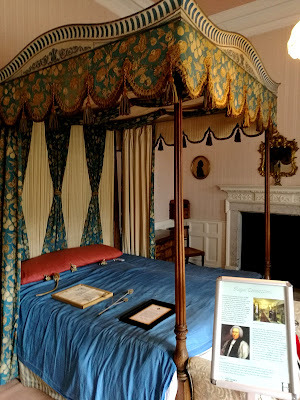 The Prince Regent's Bed, Hartlebury Castle (Author)
The Prince Regent's Bed, Hartlebury Castle (Author)
All photographs are the property of the author unless otherwisestated and may not be copied or shared without the owner’sexpressed permission.
May 16, 2023
Historic Palaces: Kensington Palace
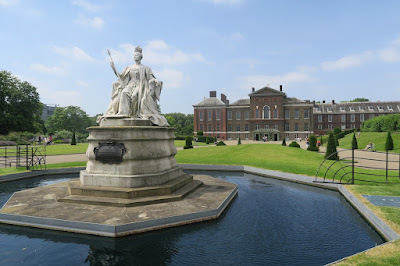 Queen Victoria's Statue with Kensington Palace in the background.
Queen Victoria's Statue with Kensington Palace in the background.Mentionedin the Domesday Book as Chenisitun, and in other ancient texts asKenesitune and Kensintune, Kensington was a village on the GreatWestern Road, about one and a half miles from Hyde Park Corner. In1829, the parish was bounded by Chelsea; St. Margaret, Westminster;St. George, Hanover Square; Paddington, Wilsden, Acton and Fulham.The Palace stood in the parish of St. Margaret, while the Gardenswere situated in Westminster.
KensingtonPalace was not always a Royal residence. Indeed, built as a modestmansion for Sir George Coppin about 1605, it was later sold tophysician and diplomat Sir John Finch, who left it to his brother,Sir Heneage Finch, afterwards the Earl of Nottingham and the LordChancellor. Thus the property became known as Nottingham House. Then,in June 1689, William III and Queen Mary paid Nottingham £18,000 forthe mansion, in order to remove from the grime and smells of theriver at the palace of Whitehall. The riverside situation worsenedthe King’s asthma, while the Queen objected to views of naught but‘...water or wall’.
SirChristopher Wren, and his clerk of works, Nicholas Hawksmoor, werecommissioned to make hurried extensions to the building, whereuponthe Court removed to the fresher air of Kensington just beforeChristmas. Various other additions were made; first the Clock Court,then the Queen’s Gallery, measuring 84 feet by 21, in 1691 and in1695-96 the King’s Gallery, measuring 94 feet by 21. With itsrestful outlook over the gardens, the latter became William’sdelight and place of relaxation following Mary’s death fromsmallpox in 1694, when aged but 33. £11,000 was spent on thesegardens by the King, the work carried out by nurserymen and gardendesigners London and Wise from nearby Brompton Park. At his owncommand, William was brought to Kensington from Hampton Court afterfalling from his horse in 1702, a fall which was to prove fatal.
 The King's Gallery, W.H. Pyne, 1819
The King's Gallery, W.H. Pyne, 1819Originallytwenty-six acres, Queen Anne added thirty more to the gardens whenshe came to the throne. London and Wise continued the work started inthe previous reign, and this was augmented in 1704 by theconstruction of a ‘Summer Supper House’, otherwise known as TheOrangery, designed by Hawksmoor and Sir John Vanbrugh. An elegantbuilding, the interior has been described as ‘tranquil’ and amost pleasant place to sit. Built of red brick, a long row ofmullioned windows allowed both glorious views and light for thosewithin.
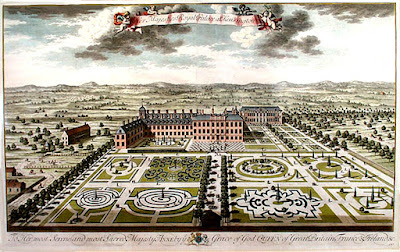 Kensington Palace from the south, Jan Kip, 1724
Kensington Palace from the south, Jan Kip, 1724WhenGeorge I ascended the throne in 1714, Nottingham House’s role as acountry seat was to change forever. Under the guidance of ColinCampbell, the house was turned into a residence fit for a king. Thebody of the old mansion was remodelled, with the addition of threenew State Rooms – the Privy Chamber, the Cupola Room and theWithdrawing Room. By 1829, the State Apartments consisted of a suiteof twelve rooms. Most of the Royal Apartments were fitted up withpaintings and decoration by William Kent, who also painted the King’sStaircase, reflecting various stories of the Court at that time. Herepresented the King’s Turkish Gentleman of the Privy Chamber,Mustafa – who was jealously regarded for his closeness to the King – Peter, the wild boy, achild and a lapdog, and even included an image of himself! Thestaircase is particularly grand, rising on two sides to a gallery onthe third, edged with a banister of intricate, scrolled ironwork.Arched panels with rich decoration enclose the paintings and standalongside ornate, pedimented niches containing statuary, while theceiling is a magnificent blaze of gilding and moulding.
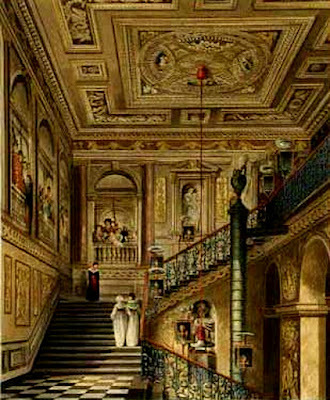 The Great Staircase, W.H. Pyne, 1819
The Great Staircase, W.H. Pyne, 1819TheCupola Room was where the great and not-so-good went to be seen, tofurther careers and seek favour with Their Majesties, and was a sumptuouschamber appointed in gold, with gilt figures and side-tables. Suspended fromthe glorious gold and blue ceiling, on purple ropes, werefour tremendous chandeliers. Centuries later, these mysteriouslydisappeared, but in 2020 new ones were hand carved and gilded, to theclosest representation as possible, to replace them.
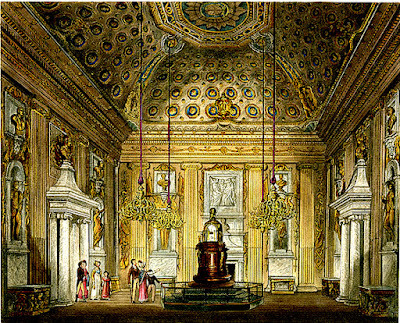 The Cupola Room, W.H. Pyne, 1819
The Cupola Room, W.H. Pyne, 1819QueenCaroline’s Withdrawing Room was a light, airy apartment where shewould sit to read, converse with her ladies or sew. The walls werelined with paintings in gilt frames, below which were setblue-covered stools, and the ceiling had a great, gilded ovalsurround to a painting featuring Mars and Minerva.
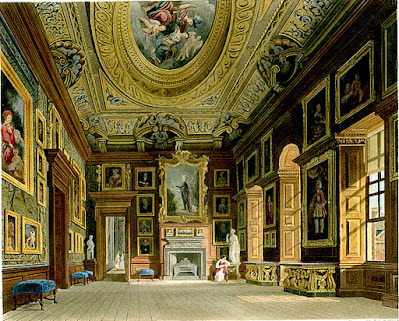 Queen Caroline's Drawing Room, W.H. Pyne, 1819
Queen Caroline's Drawing Room, W.H. Pyne, 1819ThePrincesses’ Courtyard (named for the King’s granddaughters) wasbuilt and new kitchens were added. With all these alterations, thebuilding became a large, irregular construction. Once George IIbecame monarch in 1727, little more in the way of structuralimprovements were made, for He and Queen Caroline concentrated on thegardens, restricting themselves, within the house, to thereorganization of furnishings and paintings. The Queen discovered,forgotten in a bureau, a parcel of drawings by Holbein. Wise andCharles Bridgeman were brought in to create a new design for thegardens, poaching 300 acres from Hyde Park for the purpose, and sothe Round Pond became a feature, as did the Broad Walk, whichextended from the palace along the south side of the gardens. In thespring this was a particularly fashionable promenade, especially onSunday mornings. At the time of these innovations the Serpentine wasalso formed, from several small ponds of the River Westbourne.
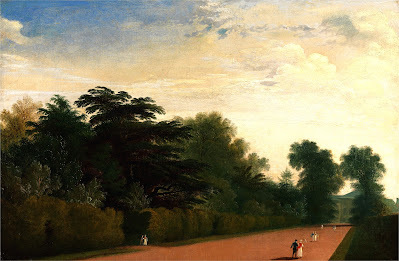 Kensington Palace Gardens, John Martin, 1815
Kensington Palace Gardens, John Martin, 1815Dueto George III choosing to live at Buckingham House, following QueenCaroline’s death Kensington Palace was put under Holland covers andclosed for four decades, much falling into disrepair, although in the1830s the Duchess of Kent made use of the State Rooms to extend herapartments. She also divided the King’s Gallery into three roomsfor Princess Victoria’s accommodation. The State Rooms were used tostore furnishings and paintings during the nineteenth century andwere rather neglected.
Althoughno monarch since George II has lived at Kensington Palace, apartmentswere made ready for Caroline of Brunswick, wife of George IV, in theearly 1800s, and then her daughter, the Princess Charlotte. FrederickAugustus, Duke of Sussex, also made his residence here. Princess(later Queen) Victoria was born at Kensington in May 1819, and grewup beset by ‘The Kensington System’ of rules and regulationsdevised by her widowed mother’s secretary and adviser, Sir JohnConroy, who seems to have had an eye to his own advancement andpower. The young Victoria was supervised in everything she did, evento moving about within the palace, yet she did enjoy riding herdonkey or driving her goat-coat around the grounds. She also drove a phaeton drawn by four ponies. However, Conroy’sattempted control over the young Princess backfired. When the PrimeMinister and the Archbishop of Canterbury arrived in the middle ofthe night to inform her that she had become Queen, she swiftlyassumed her authority and insisted upon receiving them alone – andshe was dressed only in her nightclothes and a dressing gown! Shethen proceeded to hold her first council at Kensington on the verynext day, 20 June 1837. After that, she packed her bags and moved toBuckingham Palace (so lavishly extended and redesigned by George IV),leaving her mother behind at Kensington. When the Duchess of Kentdied in 1861, the Duke and Duchess of Teck moved into her apartments.Queen Mary was born there in 1867.
In 1897 Parliament was persuaded to release funds to the tune of £36,000 for the refurbishment of thepalace, after which the State Apartments were opened to the public onQueen Victoria’s 80th birthday in 1899. The gardens hadbeen open to view since George II’s reign. In 1923, the Palace wasreopened after housing the London Museum. Princess Margaret, sisterof the late Queen, lived at Kensington for almost 42 years, andDiana, Princess of Wales, lived at the palace following her weddingto the then Prince Charles, on 29 July 1981, until her death in Parison 31 August 1997. One of her favourite places was the Sunken Garden,commissioned by Edward VII in 1908; it sits in a part of the gardenonce the domain of hot-houses and potting sheds.
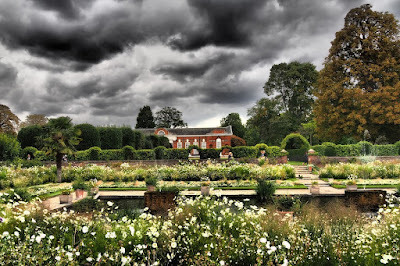 The Sunken Garden
The Sunken GardenTodaythe Palace is the official London residence of the Prince andPrincess of Wales and their children, the Duke and Duchess ofGloucester, the Duke and Duchess of Kent, and Prince and PrincessMichael of Kent.
©Heather King
All images are in the Public Domain.
March 20, 2023
Rambling in the Regency

I am delighted to be able to announce the publication, today, of the paperback version of Volume II of The Horse: An Historical Author's and Reader's Guide! Packed full of information with respect to the horse when used for travel - care, treatment, harness, the carriages and coaches he was put to, and the major coaching inns of London - this book contains everything you didn't know you needed to know!
I do hope it proves useful and entertaining. There are a few changes from the Kindle copy, so that will be updated in due course.
All the best,
Heather
January 9, 2023
The Horse: An Historical Guide

FINALLY... after months and months off scurrying down endless rabbit holes and the diligent study of an extraordinary amount of research material, I can proudly reveal the publication of The Horse: An Historical Author's and Reader's Guide, Volumes II and III, which in the e-book are one volume. Two for the price of One!
Companions to The Horse: An Historical Author’s And Reader’s Guide Volume I, Volumes II and III are mainly aimed at those interested in the Georgian/Regency era, although they also cover a wider historical period. The series of volumes offer a fascinating journey through the eighteenth and nineteenth centuries, being packed with information vital to the historical author and of interest to any reader with a passion for horses. Bowling along the major routes, past picturesque coaching inns, we visit racecourses and other places of pleasure whilst meeting a rogue or two along the way.
This book (two paperback volumes will be available in due course) will give the reader an insight into the way horses were treated, regarded and employed for both travel and pleasure, covering driving history and methods; harness; carriages and coaches; the arrival of the postal service; the major London inns, the main mail roads leading from the capital and the inns which sprang up along them.
I hope authors and readers everywhere will find the series not only useful but also entertaining and informative. Enjoy!
Heather
October 31, 2022
Nutcrack Night ~ Hallowe’en In The Regency
I cannot believe it is a year since I last wrote a post for A Regency Reticule! Where has the time gone to? It has been a very busy year.I thought I would look at Hallowe'en from the Regency perspective rather than the event we celebrate today.
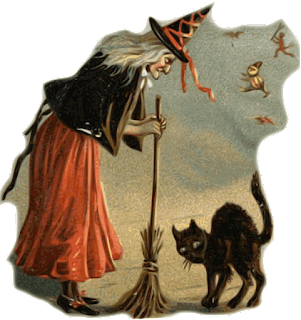
Chiefly a northern festival, Hallowe’en, Hallow Even or Holy Eve were all alternative or colloquial terms (described by the Reverend John Platt in 1827 as ‘vulgar’) for All Hallows’ Eve, the last day of October. This was the night before All Saints’ Day, the Christian appropriation of the old Celtic feast of Samhain. This is the night when the veil between the world of the living and that of the spirit realm is at its’ thinnest, allowing the two to merge and the undead to live again.
Dating from the middle of the sixteenth century, the term All Hallow Eve was overtaken by that of Hallow-e’en or Hallowe’en in the last years of the seventeenth century, particularly in Scotland. It is not therefore surprising that Sir Walter Scott should include a spirit in one of his early works, The Monastery, published in 1820. Central to the tale is the Glendinning family, the scion of which, Halbert, is a sprightly, impetuous youth – and jealous of the apparent affection Mary of Avenel holds for his brother.
‘He arrived at length in a narrow and secluded cleuch, or deep ravine, which ran down into the valley, and contributed a scanty rivulet to the supply of the brook with which Glendearg is watered. Up this he sped with the same precipitate haste which had marked his departure from the tower, nor did he pause and look around until he had reached the fountain from which the rivulet had its rise.
Here Halbert stopt short, and cast a gloomy, and almost a frightened glance around him. A huge rock rose in front, from a cleft of which grew a wild holly-tree, whose dark green branches rustled over the spring which arose beneath. The banks on either hand rose so high, and approached each other so closely, that it was only when the sun was at its meridian height, and during the summer solstice, that its rays could reach the bottom of the chasm in which he stood. But it was now summer, and the hour was noon, so that the unwonted reflection of the sun was dancing in the pellucid fountain.
“It is the season and the hour,” said Halbert to himself; “and now I—I might soon become wiser than Edward with all his pains! Mary should see whether he alone is fit to be consulted, and to sit by her side, and hang over her as she reads, and point out every word and every letter. And she loves me better than him—I am sure she does—for she comes of noble blood, and scorns sloth and cowardice.—And do I myself not stand here slothful and cowardly as any priest of them all?—Why should I fear to call upon this form—this shape?—Already have I endured the vision, and why not again? What can it do to me, who am a man of lith and limb, and have by my side my father's sword? Does my heart beat—do my hairs bristle, at the thought of calling up a painted shadow, and how should I face a band of Southrons in flesh and blood? By the soul of the first Glendinning, I will make proof of the charm!”’
Halbert then bowed three times to the holly tree and the same to the fountain, uttering a rhyme, thus producing ‘...a figure of a female clothed in white...’
'There’ something in that ancient superstition,
Which, erring as it is, our fancy loves.
The spring that, with its thousand crystal bubbles,
Bursts from the bosom of some desert rock
In secret solitude, may well be deem’d
The haunt of something purer, more refined,
And mightier than ourselves.
OLD PLAY.
‘Young Halbert Glendinning had scarcely pronounced the mystical rhymes, than, as we have mentioned in the conclusion of the last chapter, an appearance, as of a beautiful female, dressed in white, stood within two yards of him. His terror for the moment overcame his natural courage, as well as the strong resolution which he had formed, that the figure which he had now twice seen should not a third time daunt him. But it would seem there is something thrilling and abhorrent to flesh and blood, in the consciousness that we stand in presence of a being in form like to ourselves, but so different in faculties and nature, that we can neither understand its purposes, nor calculate its means of pursuing them.
Halbert stood silent and gasped for breath, his hairs erecting themselves on his head—-his mouth open—his eyes fixed, and, as the sole remaining sign of his late determined purpose, his sword pointed towards the apparition. At length with a voice of ineffable sweetness, the White Lady, for by that name we shall distinguish this being, sung, or rather chanted, the following lines:—
“Youth of the dark eye, wherefore didst thou call me?
Wherefore art thou here, if terrors can appal thee?
He that seeks to deal with us must know no fear nor failing!
To coward and churl our speech is dark, our gifts are unavailing.
The breeze that brought me hither now, must sweep Egyptian ground,
The fleecy cloud on which I ride for Araby is bound;
The fleecy cloud is drifting by, the breeze sighs for my stay,
For I must sail a thousand miles before the close of day.”
The astonishment of Halbert began once more to give way to his resolution, and he gained voice enough to say, though with a faltering accent, “In the name of God, what art thou?” The answer was in melody of a different tone and measure:—
“What I am I must not show—
What I am thou couldst not know—
Something betwixt heaven and hell—
Something that neither stood nor fell—
Something that through thy wit or will
May work thee good—may work thee ill.
Neither substance quite nor shadow,
Haunting lonely moor and meadow,
Dancing; by the haunted spring,
Riding on the whirlwind’s wing;
Aping in fantastic fashion
Every change of human passion,
While o'er our frozen minds they pass,
Like shadows from the mirror’d glass.
Wayward, fickle is our mood,
Hovering betwixt bad and good,
Happier than brief-dated man,
Living twenty times his span;
Far less happy, for we have
Help nor hope beyond the grave!
Man awakes to joy or sorrow;
Ours the sleep that knows no morrow.
This is all that I can show—
This is all that thou mayest know.”
The White Lady paused, and appeared to await an answer; but, as Halbert hesitated how to frame his speech, the vision seemed gradually to fade, and became more and more incorporeal. Justly guessing this to be a symptom of her disappearance, Halbert compelled himself to say,—“Lady, when I saw you in the glen, and when you brought back the black book of Mary Avenel, thou didst say I should one day learn to read it.”
The White Lady replied,
“Ay! and I taught thee the word and the spell,
To waken me here by the Fairies' Well,
But thou hast loved the heron and hawk,
More than to seek my haunted walk;
And thou hast loved the lance and the sword,
More than good text and holy word;
And thou hast loved the deer to track,
More than the lines and the letters black;
And thou art a ranger of moss and of wood,
And scornest the nurture of gentle blood.”
“I will do so no longer, fair maiden,” said Halbert; “I desire to learn; and thou didst promise me, that when I did so desire, thou wouldst be my helper; I am no longer afraid of thy presence, and I am no longer regardless of instruction.” As he uttered these words, the figure of the White Maiden grew gradually as distinct as it had been at first; and what had well-nigh faded into an ill-defined and colourless shadow, again assumed an appearance at least of corporeal consistency, although the hues were less vivid, and the outline of the figure less distinct and defined—so at least it seemed to Halbert—than those of an ordinary inhabitant of earth. “Wilt thou grant my request,” he said, “fair Lady, and give to my keeping the holy book which Mary of Avenel has so often wept for?”
The White Lady replied:
“Thy craven fear my truth accused,
Thine idlehood my trust abused;
He that draws to harbour late,
Must sleep without, or burst the gate.
There is a star for thee which burn’d.
Its influence wanes, its course is turn’d;
Valour and constancy alone
Can bring thee back the chance that's flown.”
“If I have been a loiterer, Lady,” answered young Glendinning, “thou shalt now find me willing to press forward with double speed. Other thoughts have filled my mind, other thoughts have engaged my heart, within a brief period—and by Heaven, other occupations shall henceforward fill up my time. I have lived in this day the space of years—I came hither a boy—I will return a man—a man, such as may converse not only with his own kind, but with whatever God permits to be visible to him. I will learn the contents of that mysterious volume—I will learn why the Lady of Avenel loved it—why the priests feared, and would have stolen it—why thou didst twice recover it from their hands.—What mystery is wrapt in it?—Speak, I conjure thee!” The lady assumed an air peculiarly sad and solemn, as drooping her head, and folding her arms on her bosom, she replied:
“Within that awful volume lies
The mystery of mysteries!
Happiest they of human race,
To whom God has granted grace
To read, to fear, to hope, to pray,
To lift the latch, and force the way;
And better had they ne'er been born,
Who read, to doubt, or read to scorn.”
“Give me the volume, Lady,” said young Glendinning. “They call me idle—they call me dull—in this pursuit my industry shall not fail, nor, with God's blessing, shall my understanding. Give me the volume.” The apparition again replied:
“Many a fathom dark and deep
I have laid the book to sleep;
Ethereal fires around it glowing—
Ethereal music ever flowing—
The sacred pledge of Heav’n
All things revere.
Each in his sphere,
Save man for whom ’twas giv’n:
Lend thy hand, and thou shalt spy
Things ne’er seen by mortal eye.”
Halbert Glendinning boldly reached his hand to the White Lady.
“Fearest thou to go with me?” she said, as his hand trembled at the soft and cold touch of her own—
“Fearest thou to go with me?
Still it is free to thee
A peasant to dwell:
Thou mayst drive the dull steer,
And chase the king's deer,
But never more come near
This haunted well.”
“If what thou sayest be true,” said the undaunted boy, “my destinies are higher than thine own. There shall be neither well nor wood which I dare not visit. No fear of aught, natural or supernatural, shall bar my path through my native valley.”
He had scarce uttered the words, when they both descended through the earth with a rapidity which took away Halbert's breath and every other sensation, saving that of being hurried on with the utmost velocity. At length they stopped with a shock so sudden, that the mortal journeyer through this unknown space must have been thrown down with violence, had he not been upheld by his supernatural companion.
It was more than a minute, ere, looking around him, he beheld a grotto, or natural cavern, composed of the most splendid spars and crystals, which returned in a thousand prismatic hues the light of a brilliant flame that glowed on an altar of alabaster. This altar, with its fire, formed the central point of the grotto, which was of a round form, and very high in the roof, resembling in some respects the dome of a cathedral. Corresponding to the four points of the compass, there went off four long galleries, or arcades, constructed of the same brilliant materials with the dome itself, and the termination of which was lost in darkness.
No human imagination can conceive, or words suffice to describe, the glorious radiance which, shot fiercely forth by the flame, was returned from so many hundred thousand points of reflection, afforded by the sparry pillars and their numerous angular crystals. The fire itself did not remain steady and unmoved, but rose and fell, sometimes ascending in a brilliant pyramid of condensed flame half way up the lofty expanse, and again fading into a softer and more rosy hue, and hovering, as it were, on the surface of the altar to collect its strength for another powerful exertion. There was no visible fuel by which it was fed, nor did it emit either smoke or vapour of any kind.
What was of all the most remarkable, the black volume so often mentioned lay not only unconsumed, but untouched in the slightest degree, amid this intensity of fire, which, while it seemed to be of force sufficient to melt adamant, had no effect whatever on the sacred book thus subjected to its utmost influence.
The White Lady, having paused long enough to let young Glendinning take a complete survey of what was around him, now said in her usual chant,
“Here lies the volume thou boldly hast sought;
Touch it, and take it,—’twill dearly be bought!”
Familiarized in some degree with marvels, and desperately desirous of showing the courage he had boasted, Halbert plunged his hand, without hesitation, into the flame, trusting to the rapidity of the motion, to snatch out the volume before the fire could greatly affect him. But he was much disappointed. The flame instantly caught upon his sleeve, and though he withdrew his hand immediately, yet his arm was so dreadfully scorched, that he had well-nigh screamed with pain. He suppressed the natural expression of anguish, however, and only intimated the agony which he felt by a contortion and a muttered groan. The White Lady passed her cold hand over his arm, and, ere she had finished the following metrical chant, his pain had entirely gone, and no mark of the scorching was visible:
“Rash thy deed,
Mortal weed
To immortal flames applying;
Rasher trust
Has thing of dust,
On his own weak worth relying:
Strip thee of such fences vain,
Strip, and prove thy luck, again.”
Obedient to what he understood to be the meaning of his conductress, Halbert bared his arm to the shoulder, throwing down the remains of his sleeve, which no sooner touched the floor on which he stood than it collected itself together, shrivelled itself up, and was without any visible fire reduced to light tinder, which a sudden breath of wind dispersed into empty space. The White Lady, observing the surprise of the youth, immediately repeated—
“Mortal warp and mortal woof.
Cannot brook this charmed roof;
All that mortal art hath wrought,
In our cell returns to nought.
The molten gold returns to clay,
The polish’d diamond melts away.
All is alter’d, all is flown,
Nought stands fast but truth alone.
Not for that thy quest give o'er:
Courage! prove thy chance once more.”
Imboldened by her words, Halbert Glendinning made a second effort, and, plunging his bare arm into the flame, took out the sacred volume without feeling either heat or inconvenience of any kind. Astonished, and almost terrified at his own success, he beheld the flame collect itself, and shoot up into one long and final stream, which seemed as if it would ascend to the very roof of the cavern, and then, sinking as suddenly, became totally extinguished. The deepest darkness ensued; but Halbert had no time to consider his situation, for the White Lady had already caught his hand, and they ascended to upper air with the same velocity with which they had sunk into the earth.
They stood by the fountain in the Corri-nan-shian when they emerged from the bowels of the earth; but on casting a bewildered glance around him, the youth was surprised to observe, that the shadows had fallen far to the east, and that the day was well-nigh spent. He gazed on his conductress for explanation, but her figure began to fade before his eyes—her cheeks grew paler, her features less distinct, her form became shadowy, and blended itself with the mist which was ascending the hollow ravine. What had late the symmetry of form, and the delicate, yet clear hues of feminine beauty, now resembled the flitting and pale ghost of some maiden who has died for love, as it is seen indistinctly and by moonlight, by her perjured lover.
“Stay, spirit!” said the youth, imboldened by his success in the subterranean dome, “thy kindness must not leave me, as one encumbered with a weapon he knows not how to wield. Thou must teach me the art to read, and to understand this volume; else what avails it me that I possess it?”
But the figure of the White Lady still waned before his eye, until it became an outline as pale and indistinct as that of the moon, when the winter morning is far advanced, and ere she had ended the following chant, she was entirely invisible:—
“Alas! alas!
Not ours the grace
These holy characters to trace:
Idle forms of painted air,
Not to us is given to share
The boon bestow’d on Adam's race!
With patience bide.
Heaven will provide
The fitting time, the fitting guide.”
The form was already gone, and now the voice itself had melted away in melancholy cadence, softening, as if the Being who spoke had been slowly wafted from the spot where she had commenced her melody.
It was at this moment that Halbert felt the extremity of the terror which he had hitherto so manfully suppressed. The very necessity of exertion had given him spirit to make it, and the presence of the mysterious Being, while it was a subject of fear in itself, had nevertheless given him the sense of protection being near to him. It was when he could reflect with composure on what had passed, that a cold tremor shot across his limbs, his hair bristled, and he was afraid to look around lest he should find at his elbow something more frightful than the first vision. A breeze arising suddenly, realized the beautiful and wild idea of the most imaginative of our modern bards {Footnote: Coleridge.}—
It fann’d his cheek, it raised his hair,
Like a meadow pale in spring;
It mingled strangely with his fears,
Yet it fell like a welcoming.
The youth stood silent and astonished for a few minutes. It seemed to him that the extraordinary Being he had seen, half his terror, half his protectress, was still hovering on the gale which swept past him, and that she might again make herself sensible to his organs of sight. “Speak!” he said, wildly tossing his arms, “speak yet again—be once more present, lovely vision!—thrice have I now seen thee, yet the idea of thy invisible presence around or beside me, makes my heart beat faster than if the earth yawned and gave up a demon.”
But neither sound nor appearance indicated the presence of the White Lady, and nothing preternatural beyond what he had already witnessed, was again audible or visible. Halbert, in the meanwhile, by the very exertion of again inviting the presence of this mysterious Being, had recovered his natural audacity. He looked around once more, and resumed his solitary path down the valley into whose recesses he had penetrated.’

Fairies, too, come abroad on Hallowe’en, making it a night full of charms and spells. In 1785, Robert Burns wrote his poem of that name and published it the following year. Here are just the first two stanzas:
UPON that night, when fairies light,
On Cassilis Downans dance,
Or owre the lays, in splendid blaze,
On sprightly coursers prance;
Or for Colzean the route is ta’en,
Beneath the moon's pale beams;
There, up the cove, to stray an’ rove
Amang the rocks and streams
To sport that night.
Amang the bonnie winding banks,
Where Doon rins, wimplin, clear,
Where Bruce ance ruled the martial ranks,
An’ shook his Carrick spear,
Some merry, friendly countra folks
Together did convene,
To burn their nits, an’ pu’ their stocks,
And haud their Hallowe’en,
Fu’ blithe that night.
Spells and magic were very much at the root of the customs and traditions of this night, which has very little to do with pumpkins, trick or treating and dressing up in scary costumes, although the Lord of Misrule does promote the last. With the exception of the Prince of Misbehaviour, these are, of course, much enjoyed by modern children of all ages but have come to us from America. On this side of the Pond, superstition, witches and warlocks, fairies and other magical spirits are the traditional componentsof this once pagan celebration on the last night of the year.
British customs, by which mainly Scots and Irish, may well have begun with a festival to honour Pomona, the goddess of fruits, for it was thought that this was the time when the stores of fruit kept for winter consumption were opened. Nuts were considered sacred by the Romans, echoing the belief from those pagan times.
Indeed, it was a Roman custom for a bridegroom to toss nuts about the room, whereupon the boys might scramble to gather them, intimating (as put forward by some) that the new husband intended thereafter to set aside the games and sports of boyhood. Nuts were also employed in perhaps the most ancient rite of divination performed on this night – that of prophesying a successful marital union. Two nuts, selected by the girl and her proposed match, were put into the fire. If they lay still and burned together, it was a sign of a happy marriage or a hopeful love. If they bounced and jumped apart, it was considered to be a sign of ill-omen. From this practice, and from cracking nuts with the teeth,came the rather charming appellation of ‘Nutcrack Night’. John Gay (1685-1732)described the custom quite beautifully in his poem, ‘Spell’.
‘Two hazel nuts I threw into the flame,
And to each nut I gave a sweetheart’s name,
This with the loudest bounce me sore amaz’d,
That in a flame of brightest colour blaz’d;
As blaz’d the fat, so may thy passion grow,
For t’was thy nut that did so brightly glow!’
Thenutty proceedings, however, werenot the first to be performed. The foremost and first act of the evening was for the younger members of the party to proceed into the garden. With eyes tightly closed, they groped to the cabbage patch, where they each pulled up a stock. These were then examined on their return to the house. The shape of each stock was said to determine the figure of the maid or youth’s future husband or wife. Thomas Pennant, in his Tour In Scotlandof 1769, confirms this practice, saying: ‘The young people determine the figure and size of their husbands by drawing cabbages blindfold on All-Hallows Even...’Then it was time to gather about the roaring fire and, with each person given a certain number of nuts, one boy and one girl put one nut into the fire, in an alternative version of the above ritual. Depending on how seriously this was taken, the outcome could cause much hilarity, happiness or horror!
Next, a barrel of water was produced containing a few apples bobbing on the surface. The young gentlemen of the company then ducked for them in the time-honoured manner, their hands behind their back while they tried to catch them with their teeth. The apples thus claimed were given to the ladies, who,according to the old superstition, then lit a candle and went alone to a room. Here, before a looking-glass, each combed her hair whilst eating the apple, in order to see the face of her future husband peeping over her shoulder.
Three dishes were then placed on a table. One contained clean water, one dirty water and one nothing at all. Blindfolded, the young gentlemen were led to the table to dip a finger in one bowl. This was repeated three times, with the bowls in different positions. If the gentleman dipped his finger in the clean water, it was a sign his future wife would be a pretty young girl; if he chose the dirty water, she would be a widow; and if fate gave him the empty bowl, he was destined to remain a bachelor.
After this came the second apple-catching tradition, one of great antiquity. From a length of thin rope or cord, a crossed stick was suspended from the ceiling or horizontal beam. At the four ends were hung, alternately, an apple and a lit candle. The cross was then set spinning, and while it was whirling, the maids and their swains tried to catch the apples with their mouths without being burned. This activity may be likened to the ancient game of Quintain. John Stow describes the sport, the province of squires and young knights in medieval England, in his Survey of London.
‘I have seen a quinten set up on Cornehill, by the Leaden Hall, where the attendants on the lords of merry disports have runne and made greate pastime; for he that hit not the broad end of the quinten was of all men laughed to scorne; and he that hit it full, if he rid not the faster, had a sound blow in his necke with a bag full of sand hanged on the other end.’
Different parts of the kingdom and, indeed, different countries, have different ceremonies and traditions. The inhabitants of St. Kilda, statedMartin Martin in 1703, observed the festival of All Saints by baking ‘a large Cake, in form of a Triangle, furrowed round,’ and that ‘it must be all eaten that Night.’ This tradition, says a correspondent in The Gentleman’s Magazine Vol. LX, Part IIfor 1790, had travelledto Ripon in Yorkshire, where ‘On the eve of All Saints the good women make a cake for every one in the family; so this is generally called cake-night.’ John Brand, in Popular Antiquities of Great Britain, 1813, adds, ‘There was formerly a custom in Warwickshire to have Seed Cake at Allhallows [sic], at the end of wheat seed-time...’
It was also the tradition in Scotland to light bonfires in every village. Once the fire had been consumed, the ashes were carefully drawn into a circle, and a stone placed near the edge for every person of those families taking part. Any stone moved or damaged by the following morning indicated that person to be fey and they were then expected not to live above a twelvemonth from that day. The bonfire was lit by consecrated fire received from the Druid priests and was supposed to remain for a year.
A similar tradition was upheld in North Wales, where a fire was lit on All Hallow Even, under the name of Coel Coeth. This was done in the most conspicuous position near each house and then kept burning for about an hour during the night. Once almost out, each person flung a white stone, previously marked, into the ashes. The company then paced about the embers, saying their prayers, before retiring to bed. Early the following morning they searched for the stones, the firm belief being that should any stone be missing, the one to whom it belonged would die before All Saints’ Eve could come again. Spooky!
On the subject of foretelling the future, though, not everyone approved. John Platt, as a minister of the church clearly did not and neither, it seems, did Robert Burns.
‘“The passion of prying into futurity,” says Mr. Burns, “makes a striking part of the history of human nature, in its rude state, in all ages and nations; and it may be some entertainment to a philosophic mind to see the remains of it among the more unenlightened in our own.”’
I wonder what they would think if they could see the ghoulish, vampiric, tricking, pumpkin-grinning and treating celebration it has become?

© Heather King
All images are in the public domain.
October 31, 2021
All Hallows Eve ~ Can A Flicker of Flame Ignite Love?
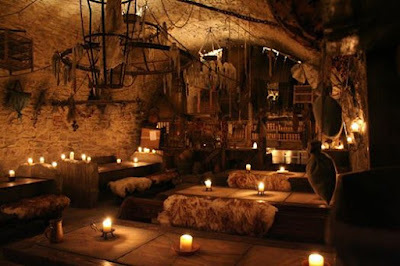
The night of All Hallows Eve approaches here in the UK, and our thoughts turn to the one night above all others when the veil between the world we know and that of the spirits is at its thinnest. This is the night when the threshold can be crossed and preternatural beings live again...
This excerpt comes from the novella, Candle of Life, part of the anthology featured on this blog. During the violent days of the English Civil War, Sabrina is a healer from a long line of wise women. She treads a narrow path in order not to be condemned as a witch.
One day, she crosses that taken by a monster and is doomed thereafter to a life against humanity... or is she?
Sabrina jerked off the straw pallet, the scream in her mind dying on her lips. She was back in the filthy tavern room, the images only memory. Shivers racked her sweat-soaked body. As she clutched the threadbare grey blanket to her, the air in the chamber seemed to move yet again and the shadows merged together. A figure materialized slowly, cautiously, from the swirling darkness in the corner of the attic chamber. It was a man – a very tall man, for he was forced to bow his head to avoid hitting the low, sloping roof.
She was too weak to scream again, but a parched, scratchy mewl grated the foetid air between them. Somehow she managed to wriggle up the prickly pallet and cower against the rough plaster wall, flakes of limewash descending unnoticed into her sweat-darkened ash-blonde hair. It was as far from him as she could get. How had he found her? Had he brought her here? Myriad questions, fearful and anguished, teemed through her mind at once.
Her fingers clutched the blanket so hard it ripped beneath her skeletal grip, the white knobbles of her knuckles gleaming like polished ivory through her dry, parchment skin.
“What do you want with me? What have you done?” she wailed. Her voice was almost lost amidst the gales buffeting the mean inn, coming wild and unfettered from the angry ocean which crashed over and over against the quay beneath the tiny window. Her throat was raw, burning each time she inhaled, the smoky air of the dreadful room catching and scraping the tender lining of her gullet.
“Be not afraid.” The man held out one hand, palm down, in a gesture intended to ease and walked forward into the pitiful light thrown by the guttering tallow candle. Sabrina noticed a plain gold ring on his middle finger. He was a big man, broad of shoulder as well as tall. His hair was jet black, reaching in thick waves past his collar; his face starkly handsome although marred with a jagged scar high on his left cheek which reached almost to the corner of his mouth. His eyes, obsidian against his swarthy skin, watched her with a gentleness she did not expect to find. Nestling in the folds of creamy lace at his throat was a large ruby, while his clothes denoted him a gentleman of substance, if not a nobleman. He wore a wine-red wool doublet, slashed at the sleeves to reveal a fine white linen shirt, and matching breeches. A pair of close-fitting leather boots encased his lower legs and feet, whilst on the back of a plain folding chair before the meagre fire reposed a heavy black cloak and hat. His voice was deep and soothing… and he was not the man she had first believed him to be.
“You’re not…” she croaked. “I thought… Why am I here? Who art thou? H-how can I be alive? He—” She broke off, closing her eyes against the flood of terrifying memories.
The stranger took the hand which had lifted from the bed and was agitatedly clawing the air. Holding it gently between both of his own, he lowered himself slowly to a rickety three-legged stool beside the bed. His clasp was cool and pleasant against her overheated skin; strangely, it eased her fear rather than increasing it. His thumb moved in tiny circles over the base of her palm.
“What I have to tell thee is going to appear the stuff of nightmares. Thou wilt think me a madman and my words inconceivable, nevertheless I beg thee to hear me out, for what I speak is the truth.”
“Where am I?” she demanded, irritated that she could manage no more than a squeak. “Are we under siege? That sound I hear, like the roar of thunder, it cannot be the ocean. This whole room shakes with it.”
“We are in a tavern by the coast. That roar is indeed the tide beating against the quay. We are right above it, which is why it seems so loud. I must apologize for the foulness of the accommodation, but it was important we should not be questioned – or disturbed.”
“I am sick. Will I infect anybody in this place?”
He shook his head, a sad smile twisting his generous mouth. Close to, hidden in his neat moustache, she could see the creases which denoted it was a mouth accustomed to smiling.
“What ails thee is not a sickness as you know it. Thy medicines and potions cannot cure it. Soon you will feel pain such as you have never known; an agony that will tear at thy insides as a hawk will tear its prey. There is only one way to prevent it.”
“You are frightening me. Am I going to die from this heinous affliction?”
“No.” He sighed as though the world were balanced upon his head, crushing him. “You have already died.”
Sabrina’s eyes all but started from her head. Clutching the blanket to her febrile and wasted body as if it could protect her from this deluded stranger, she tried to edge further away from him. Shaking her head, she attempted to remove her hand from his grasp.
“No, no, you speak words of the devil! I am seeing things which are not here. Go away, foul servant of Satan. Allow me to die in peace!”
He leaned forward and grabbed her wrists. She inhaled sharply and caught the scent of him – cloves, wine and something less easy to discern, a sweet odour akin to that of fresh rabbit meat after skinning. She realized she could also smell boiled cabbage, fish and ale as strongly as if she were in the room in which they had been consumed. The steady beats of a dozen hearts thumped inside her brain and she heard someone nearby grunting in his sleep.
In alarm, she tried to pull away from the handsome stranger, but while his grip tightened, it was gently done. She could not break free, but he was not hurting her. His eyes bored into hers, holding her gaze captive. After a moment, her panic lessened.
“My brother attacked thee and drank thy blood,” he said deliberately. “He left you for dead. I was searching for him and came upon you in your hut in the forest. I had no choice. I had to make you one of us, or leave you to die.”
“One of us?” Her voice was a husk of sound, barely even a whisper.
He looked away, his expression troubled, his jaw set. “My brother and I… are vampires. I had to bring you across to the dark side or you would be dead now.”
She stared at him in horror. “Vampire? You made me a vampire? I thought such things were stories, made up by the priests to frighten the little ones. You’ve turned me into a monster! You should have let me die!”
Her voice cracking with emotion and strain, she snatched her hands free and threw herself across the narrow bed. A spasm of excruciating agony clutched at her entrails at the same moment and she tumbled, writhing, on to the filthy floor. The stranger rushed to her side and gathering her up, laid her gently back on the bed.
“Let me ease your pain,” he said. “You need to feed.”
Clenching her jaw, she shook her head. “No. I cannot.”
Another burst of pain sliced through her abdomen. She felt as though she were being eaten alive from within. Tortured sounds not unlike those she had once heard coming from a castle dungeon issued from her mouth to fill the tiny chamber. Unknowingly, she gripped the man’s forearm, digging her nails into his flesh even through the layers of doublet and shirt. He hissed, the sibilance shockingly loud in her new sensitized condition, but did not withdraw.
“It will only get worse. You cannot deny what you are.”
“Finish it. Finish me,” she cried. “I am a healer. I cannot take life.” Tears rolled unchecked down her cheeks and blotted the flour-coloured bodice of her muslin shift with dull, red-tinged spots. She eyed them with a dread bordering on hysteria. She could feel it welling up inside her with the same force the tide had amassed outside. As if he knew, the stranger stroked his thumb across her cheek, wiping the wetness away and somehow reducing her trepidation.
“You do not have to. You may feed from me until you have control. If you are careful how you do so, you may in time use your blood to heal,” he told her.
She switched her fascinated gaze from the unnerving evidence which revealed the truth of what she had become and locked it with his.
“Who are you?”
“Later.” Never taking his ebony eyes from hers, he lifted his other arm and bit into his wrist. Rich, crimson nectar flowed from the two neat punctures he had made and Sabrina’s nostrils quivered. The warm, sweet smell made the savoury aroma of the tastiest rabbit and onion stew a forgotten memory. Her mouth watered and she licked her lips. Although vaguely disgusted with herself, she took hold of the offered wrist and fastened her mouth over the wound. The sweet coppery flavour was the most glorious she had ever experienced, better even than the almond sweetmeats she had once tasted at a fair, and she drank greedily.
The stranger, whose name she still did not know, stroked her damp hair back from her brow.
“Sip gently,” he murmured. “My brother’s poisoned blood has made you like this, made you weak. If you drink too freely it will have the same effect as if you had imbibed a whole flagon of the best French wine. You must take only a small quantity at a time for a few days.”
Having overcome her revulsion, she was inclined to feast and take no notice of him. The hunger demanded that she do so, yet equally something in his quiet tone commanded her compliance, even though he had neither insisted nor removed his arm from her grasp. Slowly and reluctantly, a few moments later she lifted her head in response to his whispered:
“Enough.”
An uncharacteristic giggle bubbled to her lips as she licked away all traces of the honeyed ambrosia of his vein. She did feel oddly light-headed. The scuttling crabs came to a standstill and the fever abated… but then, as swiftly, great shudders racked her slender frame, shaking her so violently she feared she would die of a palsy.
“Help me!” she groaned. “What is wrong? You said your blood would heal me! Did you lie? Do you get some depraved joy from killing me this way?”
She clutched both hands to her stomach and bent forward as more pain washed over her. Screwing up her face, she clamped her teeth together to keep from either biting herself with her fangs or disturbing the whole inn with her screams. Warmth bloomed along the right side of her body as the straw rustled and the rope springs squeaked and dipped. The movement of the bed sent her sideways into a heavy wall of muscle.
“Hush, sweet dove, hush.” The man’s arms came around her even as his voice offered reassurance. “All will be well, I promise you. My blood is fighting the poison in your veins introduced by my brother’s bite. That is why you must not take too much.”
His palm lightly caressed her brow and continued down the side of her face to brush a tendril of her long dirty hair out of her eye and behind her ear. Part of her was deeply shocked that she could permit such an intimacy with a man she did not know – with any man. The only man ever to be this close to her had been her father, a kind, intelligent man whom she had loved dearly. Yet it felt so right to be in this stranger’s arms that she pushed from her mind all awareness of her state of undress and the fear of what was happening to her. For the first time since her mother had died, she felt safe and not alone. Whatever the future might hold, she would take this moment of tenderness and pray that he did indeed speak the truth and all would be well.
His hand continued to gently caress her locks; long, sweeping strokes which seemed to smooth away the terror, the grief and the torment. He whispered to her, his voice deep and melodic, the words in a language she did not understand. She smothered a yawn with her hand and closed her eyes…
***
Sir Jasper Mortimer gazed down at the pale blonde head cradled in the hollow of his shoulder and breathed a silent sigh of relief. She slept at last. His vampire powers were strong and he could have compelled her, but he had not wished to do so. It was enough that he had touched her thoughts to calm her and ease the pain of the conversion. It was more than enough that he had been forced to convert her in the first place. Unbidden, his mind filled with the pictures of when he had first seen her.
He had been following his brother for some weeks, altering memories, calming the hysteria caused by the cur’s ungovernable bloodlust and endeavouring to prevent the mass revolt and destruction Ralph, no doubt, had planned. Word had reached Jasper, via a network of souls loyal to the King, that his brother was headed into the Royalist strongholds of the west between Worcester, Nottingham and the Welsh Marches. He had almost caught up with him at the manor of Beckford and it was there, close on Ralph’s heels, that he had found the woman in his arms.
He had heard her screams from several miles away, having continued on in the direction of Shrewsbury, surmising that to be his brother’s likely route. By the time he had located the tiny dwelling in the vast oak forest, Ralph was once more long gone and his victim, her throat ripped, bleeding her last drops of precious lifeblood on to the crimson spattered plank floor. Red had also patterned the rough cabin walls and soaked into a russet and tan coloured rug made of strips of rag, upon which the girl had fallen.
Thinking her already dead, Jasper had cursed and turned himself to mist in order to follow more easily the man he hated above all others, but then, as he paused above the inert body, gazing with sorrow upon the most beautiful woman he had ever seen, he had heard the faintest throb of her heart. Returning at once to human form, his fangs lengthening simultaneously, he had not hesitated. Gently he had taken a mere drop or two of the sweetest nectar he had ever tasted, then tearing his wrist, had dribbled his own blood into her mouth… He had then carried her with the supernatural speed of his kind to this foul alehouse, the farthest he could safely take her.
He switched his black perusal from her pallid countenance to the tiny square casement in the outer wall. The wind had lessened and the noise of the ocean with it. The tide did not withdraw completely here, but the water level did fall. Beyond the coarse, filthy glass, the sky was purple streaked with grey, whilst iridescent bands of pale blue on the horizon heralded the coming of dawn. He did not need to see it; the tingling over his skin was warning enough. Sabrina – he had heard her name in her thoughts – would sleep the Dark Sleep of the newly converted now until night fell. Then he would know if he had saved her, or if he would be forced to kill her. A heavy sigh parted his lips. It would be one more iniquity to lay at the feet of his evil sibling, he thought, if Ralph, not content with murdering their father and making Jasper Vampyre, should be the cause of such a terrible circumstance. For, as he considered the sleeping maid, Jasper had a strong presentiment that he had already fallen in love with her. If she did not survive the conversion, he made himself an oath he would spend the rest of eternity hunting his brother down, thence to end his existence in the most excruciating manner possible.
Easing himself carefully out from beneath her, he collected his thick cloak from the chair by the dying fire, with a wave of his hand rekindled the embers into a blaze of red and gold flames and crossed to the window. With a grimace he covered the glassed aperture, checked the door was locked and having, for good measure, barred it with a solid chest, returned to the bed. He removed his doublet, folded it and placed it on the stool, then pulled off his boots, setting them neatly on the floor beside it. Sliding back in beside Sabrina, he drew her once more into his arms and pulling the blanket, which smelled unpleasantly of stale bodily fluids, over both of them, prepared to accept his own unholy slumber.
He had taken a big risk, billeting them in a public hostelry, but he had had little choice. Sabrina had been too weak to be transported far, even by preternatural methods, and he had needed to get her as far from his brother’s likely vicinity as possible. If Ralph even suspected Jasper’s involvement before Sabrina had recovered, then her very soul would be at risk. Having taken almost all her blood, Ralph would be able to turn her into the very monster she feared she had become, simply by controlling her thoughts. Jasper needed time to teach her how to defend herself.
Unaccustomed emotion flooded his being and lodged in the back of his throat. Without quite understanding the compulsion he felt, he lifted her lifeless hand and brought it to his lips, placing a kiss in the centre of her still-moist palm.
“I know not why this has happened now, with you, when I have known many a maid in my lifetime,” he whispered, “but I swear to you I shall use all my power to keep you from harm.”
Praying to a God he was not sure existed and whom he no longer believed in, he held their entwined fingers against his chest. Please, God, if you hear me, let this have worked.
No part of this text may be reproduced in any form without the expressed permission of the author.
© Heather King

October 30, 2021
The Purrfect House Guest?
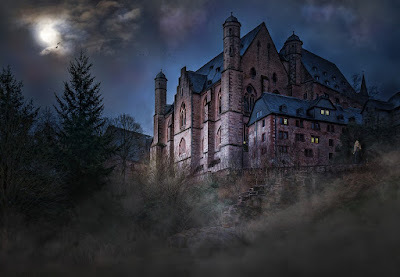
The next snippet of a story from Vampires Don't Drink Coffee and Other Stories, in celebration of Hallowe'en 2021, tells the tale of Melissa, who suddenly finds herself homeless and then the beneficiary of a house in the country in her aunt's Will. As we pick up the story, she has just arrived.
A cup of tea, she thought briskly. Everything always looked better over a cup of tea. As she went into the kitchen she noticed a door going down to a cellar or basement, but found it locked and the key missing. Shrugging, she located the kettle, filled it and switched it on, then fetched in her meagre luggage. Having put away her provisions, she made herself a cheese sandwich.
The sky grew darker and darker, forcing her to put the light on. The air seethed with menace, the clouds a deep purple edged with violet shading into black. The wind whistled down the flue of the kitchen range and moaned under the eaves. Bouncing on its hinges, the solid wooden door into the walled garden swung open, then crashed shut again. Melissa forced herself to take slow, deep breaths.
A low rumble reverberated across the heavens, soon followed by a jagged flash of lightning. Rain came on its heels, slashing diagonally from the livid firmament, a strange yellow light issuing from beneath the black thunder-heads. There was a sharp crack and the kitchen light went out. With recent events so fresh in her mind, Melissa shrieked and dived under the wide pine table, her heart jumping towards her mouth. Cliché or not, lightning had been known to strike twice...
She wrapped her arms around her head, the chunky sleeves of her thick brown cardigan helping to give the illusion of safety as she lowered her face towards her folded legs and curled herself into a tight ball. The elements roared and crashed outside the house, a primal game of Quidditch between the forces of heaven and earth. Electricity sizzled and snaked across the angry sky; the wind howled through the crone-fingered branches of the plum tree outside the back door and the fierce downpour gouged furrows in the pinkish grey gravel of the yard.
How long she huddled there, trying to ignore the raging thunderstorm, she could not be sure, but gradually she realized it was quieter overhead. She braved a look out of the window, a tall casement painted white with four panes of glass, and saw from the greying light that due to the storm, dusk had fallen early. Also, unsurprisingly, this being the middle of September, the temperature had dropped several degrees, despite the residual warmth from the oil-fired stove. The drum solo outside was still going on, but with slightly less intensity, indicating that the electrical orchestra was slowly moving away.
Easing her cramped limbs, Melissa crawled out from under the table, pulling her fingers through her long, caramel-coloured locks.
“Good evening.”
She jumped at the unexpected greeting, fetched herself a vicious bang on the head and squealed loudly.
“Ow! Damn it!”
A candle flared to life and the owner of the rich, velvety voice stepped forward into its gentle light.
“Who the hell are you?!” she demanded. Still on her knees, she cradled her sore head in one hand, too concerned with her hurt at that moment to have time for fear.
“You must be Melissa,” he said. “I am Giorgio.”
“What!”
“You received your aunt’s letter from the solicitor, did you not?”
Melissa nodded, her startled wits struggling to cope with the reality of a tall, dark haired and sinfully handsome man instead of the feline she had imagined.
“Oh my...” she breathed, “you’re not a cat, you’re a toy boy!”
Lips twitching, Giorgio slid a wry glance down his muscular torso. “Hardly a boy,” he remarked without a trace of self-consciousness.
Melissa’s cheeks flamed. She had not meant him to hear. “I’m sorry,” she stammered. “It’s just I thought... I assumed... quite wrongly, obviously... that my aunt... must’ve acquired a cat... or something...” Her voice faded in embarrassment, her eyes unable to meet his, with their lurking enjoyment of her discomfiture, yet at the same time drawn to his magnificently toned body.
He was wearing a black sweatshirt and black jeans, emphasizing his narrow hips and broad shoulders. Melissa suddenly felt breathless. She and Ian had never been intimate; she had wanted to wait for her wedding night and he – as events had so tacitly proven – was almost pathologically shy of commitment. Not only had he not supported her in her time of need, he had almost always managed to wriggle out of family gatherings and had never invited her to spend the night at his flat, although he had slept on her sofa often enough. In spite of this, however, she had no doubts as to the meaning of the heat pooling in her loins. For the first time in her life she felt an overwhelming physical attraction to a man.
As if he was aware of the effect he was having on her, Giorgio smiled with feline satisfaction and raised her hand to his lips.
“I bid you welcome, Miss Andrews,” he said with old-fashioned courtesy.
Aroused from her trance, Melissa snatched her hand away and jumped to her feet, resisting the urge to rub her tingling skin on her jeans.
“So who are you, the butler, the gardener or – or a conman on the take?” she asked tartly, taking refuge in indignation.
Giorgio’s grey eyes took on a stormy hue, but his voice was deceptively calm when he replied:
“I am, you might say, a permanent house-guest.”
“And how did you talk my aunt into that one? Hypnosis, or good old-fashioned blackmail?!”
Melissa knew she was being rude, but could not help herself. What other explanation could there be? Her aunt had been eighty-three, not averse to the occasional game of Bridge with her friends, but mostly happy to potter in her garden, doze over a book and generally live out her days in quiet seclusion. She had died naturally on that bench – or had she? Melissa looked at the man in sudden alarm.
He rounded the table with the easy tread of a panther; before she could move, he was in front of her, his hands grasping her shoulders. She knew a stab of fear even as she raised her chin in an effort to quell the electricity which surged through her at his touch. She met his smouldering gaze squarely, but could not prevent a nervous swallow. Power exuded from him; a power she was scared to admit, even to herself, that she found intriguing.
***
Giorgio’s mind registered in passing that the girl was so slender, she was almost undernourished. Her shoulders were thin; her beautiful face, lifted so defiantly to his scrutiny, fine-boned and doll-like. He took her chin between finger and thumb, well aware that she was trembling – and why. The pulse of her blood called to him; the scents of her soap and shampoo, the food she had eaten and the essence that was purely Melissa bombarded his senses. He had been aware of her presence from the moment she had arrived, but had not been prepared for the way his blood thrummed with desire the instant he made contact with her body. It would be so easy, he thought, to bend her to his will, to taste her sweetness, but she was innocent and afraid. He would not take advantage, even though the beast within him demanded otherwise. He squeezed her chin.
“Did your mother not teach you to be polite to guests?” he asked, deliberately making his voice calm and compelling. His eyes held hers when she would have looked away, full of remorse.
“I – I’m sorry,” she mumbled. “I’m not normally rude. But... my aunt... was elderly, and you... you’re...”
Giorgio raised an eyebrow. “I?”
You’re gorgeous! Her thought was as clear to him as if she had spoken it aloud, but he carefully maintained a neutral expression as she stammered a response.
“You’re young... my aunt lived alone... I jumped to conclusions. I don’t know what came over me. Sorry.”
“I am older than you think, Melissa,” he said softly. He smiled, but it was laced with irony.
Born in Italy, the son of a poor farmer, he had been discontented and resentful. Tilling the stony soil, working from dawn to dusk for barely enough to live on had not suited his adventurous soul. He had wanted more from life. He had wanted to see the world. One day, after a fight with his brother, he had sought solace in a tavern, where he met a beautiful stranger. She flattered him, enthralled him with a pair of tantalizing dark blue eyes and then, with the kiss of death, damned him for eternity. He was twenty-five.
He drifted the world for centuries, able to see all those faraway places of which he had dreamed, but discovering, as the years went by, that he was more fettered than he had ever been as a mortal. Forced to exist on the fringes of humanity, feared and hunted; exiled from his family, he was compelled to endure, for decade after decade, a solitary lifestyle which was empty, lonely and meaningless. He was on the edge of madness when, following an abortive attempt to end his suffering in the rays of the new sun, Melissa’s Aunt Melody discovered him in her father’s churchyard.
For seventy-three years Melody had protected his existence, culminating in the purchase of this remote house after she inherited her father’s estate. Then when she had become ill, she had discussed with Giorgio the advisability of telling her niece the true nature of that existence, and after much deliberation, had decided it was best he judge for himself when the moment was right to do so. He had no doubts that now was not that time.
He brushed his thumb across Melissa’s lower lip. “We should be friends for your aunt’s sake, do you not agree?”
She nodded. He had deliberately mesmerized her with his touch, but only enough to keep her calm. He leaned in towards her. At once he saw in her eyes that she was wondering if he was going to kiss her; she was clearly not sure whether she wanted him to.
“You are safe with me, bella, just as your aunt was,” he said quietly, straightening again. “We were friends, nothing more. I am not what you fear.” Little do you know, it is far worse, he thought with a wry twist of his lips.
No part of this text may be reproduced in any form without the expressed permission of the author.
© Heather King

October 29, 2021
An Otherworldly Duel

He knew he was about to die. Sebastian surveyed the vast forest clearing, using his preternatural sight to pierce the thick darkness which surrounded him. The ranks of oak, birch and sycamore trees stood close together beyond the stumps and blackened grass of the forester’s work-area, bastions against the forces of evil – except that was a fallacy, he knew. The forces he stood against would crush them without a thought.
His breath caught in his throat. He prayed that Jeannie was safe, that his strategy had worked. Fear coursed through his veins for her. His woman. His love. His life. Without her he would be as nothing and he might as well walk into the sun and let it destroy him. He would do it willingly if it would save her.
His thoughts turned inwards, drifting back to three days before. He had taken Jeannie out to dinner to celebrate her twenty-fifth birthday. Being a vampire, he could not eat, of course, but he had used his powers to give that illusion to those frequenting the intimate Italian restaurant, so that Jeannie could enjoy the occasion. He remembered her eyes twinkling with collusive merriment as he sipped a glass of red wine. Raising the glass, he had silently saluted both her intelligence and her beauty.
Tall and slender, she yet always seemed diminutive from his own six-feet-four-inch frame. She had worn a silky sheath dress in jade green which caressed her gym-toned curves in a way he had envied. From its perch in an empty wine bottle, the candlelight had flickered over the warm red tablecloth, turning her skin almost translucent and her hair into a river of chocolate satin. The smell of her favourite perfume, Elle, had teased him, tempting him to whisk her home to his mansion, there to indulge his every fantasy, but this night was for her. He had given her a beautiful, delicately-wrought antique necklace of gold clusters set with emeralds and her coffee-coloured eyes had turned caramel with pleasure.
He had toyed with asking her to marry him. They had been together for eighteen months, yet it seemed only yesterday that she had run from him in terror, after she had realized what he was, that vampires did exist. He smiled to himself. She had been so brave. She had been unable to deny their attraction any more than he had. Not in five hundred years had he met anyone who could make him feel as she did. She did not allow him to take himself too seriously. She was lightness and laughter to his sombre darkness; she was strength and vitality. She brought warmth and happiness to his cold, dreary existence, whilst the passion they shared in bed he had never known with any other woman in all his centuries upon the Earth.
Her birthday would have been the ideal time to ask her, but he had held back the words, shy of declaring himself. He knew that some day she wanted children, the one thing he could not give her. As a vampire, he was infertile. Yes, they could adopt, but how to explain his strange lifestyle? How to explain why he never aged, while Jeannie did? For Jeannie was mortal and deserved a normal life, growing old with a man who loved her. Sebastian’s fangs pricked his lip at the thought of his Jeannie with another man.
The taste of blood brought him back to the present. Jeannie could never have a normal life. What was he thinking? She was human, yes, but she had otherworldly powers. She came from a long line of powerful healers, dating back to the beginning of time. She could reach deep within herself, harness such feelings as love, strength, hope and self-worth, and pour them out via touch or thought, wherever their essence was needed.
As a child, her touch had healed minor injury; through her teenage years, she had developed emotional and spiritual healing. At the advent of her quarter century, as was the way of her family, her powers had matured, increasing ten-fold. She could now draw on the forces of nature to save life, yet the stronger the energy she used, the more it took from her and the more vulnerable she could be afterwards. She was unable to kill, even to protect herself, and the more she used her abilities to thwart evil in its many forms, the easier she would be to find… for now she wasn’t only desirable for her bubbly personality and stunning looks, she was sought by the demons of the underworld to vanquish death.
She was well aware of her destiny, for she had told Sebastian her history. Her mother had died fighting demons when Jeannie was twelve, and her sister Theresa was currently hard at work with other psychically talented people in a secret government programme. Their father was a sensitive, highly intelligent man, but the healing gifts were passed from mother to daughter and to his chagrin, he could do no more for Jeannie than any other loving sire. With a vague unease her only warning mechanism to alert her to danger, she had few defences until she was able to hone her skills. Sebastian never let it show, but the knowledge terrified him. What if something happened to her while he was under the influence of the Dark Sleep – held in stasis until the sun went down – and therefore unable to protect her?
On the way home from Alberto’s, he had sensed a demonic presence. It was a minor being – a foot soldier, a scout – and he had easily disposed of it, but where there was one, many more would follow, and with Jeannie in their claws, the souls of Hades would be reborn, overrunning the world with evil.
Sebastian shuddered and pulled the collar up on his black leather jacket. A monster he might be, but he had never been evil. He had always maintained a sense of right and wrong. He shifted his weight from one foot to the other, sweeping the trees again. They were bare of foliage, their stark black branches spreading across the dark purple sky, rustling eerily as though a thousand voices were whispering. Dying bracken hugged the forest floor, filling the mild February night with the damp stench of rotting vegetation.
He forced himself to concentrate. He must not allow his thoughts to distract him. There was too much at stake, although Jeannie should be safe enough for now. She was hidden in his basement, in his lair, lying fully clothed and insensible on his bed. He had mesmerized her and put a guard on her mind. If he closed his eyes, her image ‒ small, defenceless, innocent ‒ was imprinted there; as well as the memory of her tearful refusal when he had first suggested the scheme.
“What if something happens to you?” she had sobbed, clutching a slender-stemmed wineglass so hard he feared it would snap. They were in his large granite and steel kitchen, and she was stacking the dishwasher. He might not need such things, but he liked Jeannie to have all the conveniences of modern life.
“Nothing is going to happen to me.” He rescued the endangered glass. “Have you forgotten I am immortal?”
“You can still be destroyed!” she spat miserably, turning her back.
Ignoring her resistance, he gently wrapped his arms about her waist and nuzzled her shoulder. “It will take more than one scrawny demon to destroy me, beloved,” he consoled.
“I don’t know what I’d do without you.” She twisted to face him. Her eyes were glistening and her nose was a soft shade of pink. Something shattered inside him.
“Nothing will keep me from you, Jeannie. You trust me, don’t you?”
She did not answer. “Demons are supernatural, too, Sebastian. If ‒ if anything didgo wrong, what would become of me?”
“In that unlikely event,” he stated arrogantly, hoping to sting her into retort, “you will awaken as if from a normal, natural sleep.”
It had taken a day or two, but her trust in him – her love for him – had allowed him to overcome her doubts. She had finally consented and earlier he had masked her vital signs so they would not be evident to any seeking her. He hoped it was enough. It had to be. He would not contemplate losing her. Mine! The word pounded in his head in rhythm with the beat of his heart – a heart that until Jeannie had entered his existence had forgotten how to beat.
A tiny sound, no more than the scurry of a mouse in the undergrowth, snapped his head up. He broadened his senses, sent them forth into the night, searching… An instant later a tree on the edge of the clearing burst into flames. Sebastian took an involuntary step backwards – and a tree behind him also combusted. Still he could not feel the demon’s presence. This one was more powerful than the one he had destroyed, to be able to cloak itself so thoroughly. Another tree ignited, then another. Sebastian waited. The heat swallowed the cool evening air and became a living thing itself, shimmering, intense, hungry for more. The vampire swallowed. He had the gift – or curse – of eternal life, but as Jeannie had protested, he could be destroyed. Fire could destroy him.
No part of this text may be reproduced in any form without the expressed permission of the author.
© Heather King
To read more, follow the links.

October 28, 2021
Preternatural Love for Hallowe'en
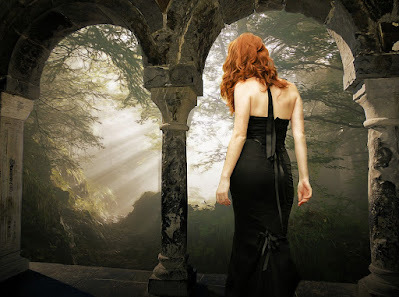
Vampires are mythical beings and therefore can be whatever the author wishes. My alter ego, Vandalia Black, writes stories about vampires who are lonely and honourable, sensual and beautiful, and in search of their eternal loves. To celebrate Hallowe'en, here is a short story from Vampires Don't Drink Coffee and Other Stories.
THE MURKY GREEN waters of the river rippled around the pillars which supported the ancient stone bridge, hinting at hidden secrets in the darkness of its depths. Mist cloaked the trees and bushes of one bank in ethereal finery and blurred the brooding shape of the old mill opposite. The girl on the bridge shivered. Such stories it could tell, she thought ‒ and hers would be just one more of them. A lone tear trickled down her cheek; she ignored it, leaving it to pursue its course without hindrance. This was no time to be sad. Her decision was made and she craved the peace it would bring.
Following the accident which had burned one side of her face, the doctors, therapists and other well-meaning folk she had not been able to avoid had all said the same. She would grow accustomed; it was amazing what cosmetic surgery could do nowadays; it was the inside of a person that mattered. She did not care what they believed. Her life was gone; her career as a photographic model, as a human, was gone; her boyfriend was gone. She was a freak, shunning the daylight like some monster. She experienced a rush of sympathy for the Phantom of the Opera ‒ she knew just how he had felt.
The darkness surrounded her like a blanket, the air seeming to stroke her although there was no wind. Jodie looked around her, convinced suddenly that she was being watched, but there was no-one to be seen, just the shifting and swirling of the mist as it danced with the night. She turned her attention back to the silent, moody water. The bridge, with a complete lack of local imagination, was known as Lovers Leap. A smile touched her lips at the irony. She had no lover and never would have now, but it was an appropriate place to make an end. Desolate, lonely and sad, it was all the things she had herself become... Tilting her head back, she stared up at the grey-shrouded heavens for a long moment. With a deep breath, she climbed on to the stone parapet.
“You are not a freak.”
Jodie gasped and spun around. A man walked forward out of the shadows by the mill. A long black cloak floated round his ankles, the mist making it appear as if he, too, was drifting above the ground.
“You will not find the peace you seek there, Jodie.” His voice, smooth and rich like a chocolate liqueur, melted over her, sending minuscule tingles of pleasure down her spine.
“Who are you? How do you know my name?” she demanded, finding her voice, although even to her own ears it sounded scratchy and weak and unlikely to dissuade him from interfering. “How did you know what I was thinking?” She felt like telling him to mind his own business, but that would have been unnecessarily rude, even if he was putting his nose in where it was not wanted.
The stranger shrugged. “It seemed a reasonable assumption,” he answered, ignoring her first questions. Slowly he approached, the mist apparently parting to allow his passage. Jodie blinked several times and swallowed with difficulty. He was the most handsome man she had ever seen, his lean, swarthy countenance enhanced by a deliciously sensual mouth and fathomless dark eyes. He held out his hand to her.
“Come. You do not really wish to die.”
“You know nothing!” she wailed. “I have to do this.”
“No. No, you do not.” The stranger’s voice was deep, compelling. Jodie found herself gazing into his eyes; then somehow, though she did not will it, her legs were unfurling and carrying her towards him. She put her hand in his.
In that same instant, a bolt of electricity shot through her, jerking her senses to awareness. She looked from the man’s face to the bridge and back, feeling disorientated as if she had just woken from a dream.
“How—?”
“Come with me, my sweet,” he murmured in the same liquid tone. “I can help you.”
“No! I—”
“You will come to no harm.” His finger followed the curve of her damaged cheek without touching it. “I can heal you.”
Jodie snorted. “You a moonlighting plastic surgeon, then?” Her voice dripped derision.
The stranger hesitated before replying. “No. A vampire.”
Hysterical laughter bubbled to her lips. That was all she needed, an escaped lunatic!
***
Dominic Véquaud smiled wryly as he read her thoughts. Why he had revealed his darkest secret he had no idea. He only knew that from the first moment he had seen the slight figure with the pale blonde hair, several nights ago, he had felt a strange urge to help her. Until tonight she had done no more than stare into the water; he had felt her loneliness, her anguish, but had been reluctant to reveal his presence. Tonight, his cold heart had flickered with life for the first time in centuries. He could not say why, but he had to save her. Lifting his hand, he ran his knuckles lightly over her unblemished cheek. Jodie shivered, her eyes widening as he held her gaze. What lay behind those ice-blue orbs was as clear to him as Venetian crystal. She was acutely aware of his size, his power and a need for something only he could give her which she found disturbing.
He offered the merest suggestion, no more; he had no wish to coerce her. As if impelled by some other otherworldly force, she stepped nearer until her chest almost brushed his, her lips parting in an unconscious invitation. Dominic lowered his head slowly, watching her, seeking permission. His arms slid behind her, pulling her closer until he knew she could feel his desire. Although she trembled, she did not pull away. He recognized prickles of fear, overlaid with ripples of exquisite sensation which he suspected no man had made her feel before. The warm smell of her reaction, combined with soap, shampoo and coffee, bombarded him. Yet above all else swam the sweet nectar in her veins, calling to him, tempting him beyond reason.
His hunger roared to life, forcing him to look away lest she see the unholy glow in his eyes. He was a hunter, but he did not kill his prey; had not done so for a hundred years or more. Nevertheless he was glad he had already fed. This woman was affecting him like no other. He craved her body and her blood with an urgency previously unknown to him, yet equally he wanted to protect her, to keep her safe.
***
Breathlessly aware that she was courting danger, Jodie raised her chin. Some instinct was pulling her towards this man; to his touch, his kiss. As he claimed her mouth, fingers of fire burned their way to her core, filling her with a new vibrancy, a new desire for life. Dominic deepened the kiss and her insides turned to melted fudge.
“Dominic,” she sighed, not caring how she knew his name.
“You are beautiful just as you are, ma belle,” he whispered, “but if you wish it, a little of my blood will heal your scar.”
Suddenly she understood what had drawn her here. With this man alone she could be whole again; with him she could seek love’s eternal flame.
No part of this text may be reproduced in any form without the expressed permission of the author.
(C) Heather King


